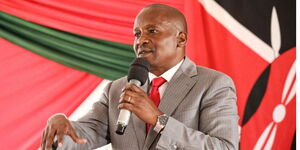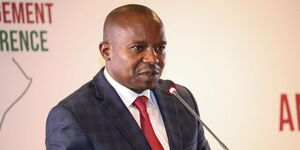In a revealing forecast by the Institute of Public Finance, the offices of President William Ruto and Deputy President Rigathi Gachagua are set to receive a significant funding boost in the 2024/2025 budget, drawing sharp criticism for overshadowing crucial sectors such as education and agriculture.
The institute's Annual National Shadow Budget, unveiled on Tuesday, April 16, indicates a notable increase of Ksh9.8 billion for the executive branches.
This allocation starkly contrasts with substantial cuts elsewhere, notably a Ksh23 billion decrease in funding for the Ministry of Education, the largest reduction among the reviewed sectors.
Adding to the controversy, national security is poised to benefit from an additional Ksh45 billion, while the health sector sees a moderate increase of Ksh8 billion. In contrast, the Agriculture, Real Estate, and Urban Development sector faces a Ksh10 billion cut, with further reductions affecting General Economic and Commercial Affairs by Ksh1.5 billion.
The Public Administration and International Relations (PAIR) sector, encompassing the presidency, cabinet affairs, and various ministries, is similarly set for a considerable bump, with a Ksh52 billion rise in allocations.
Bernard Njiri, a Senior Research Analyst at the Institute, expressed concern over the imbalances: "Why should one office get such a huge increase compared to a whole sector?"
The Shadow Budget projects allocations for other key areas: Ksh666 billion for education, Ksh505 billion for energy, infrastructure, and ICT, and Ksh127 billion for environment, water, and national resources. Meanwhile, agriculture is earmarked for a comparatively lower Ksh87 billion.
Scheduled for release in June, the country's official budget is predicted based on past fiscal data and supplementary budgets from the Treasury. The Shadow Budget serves as an early indicator of the government’s fiscal priorities and strategies.
The research further highlighted a troubling trend among county governments, which have consistently failed to meet their revenue collection targets, relying heavily on national allocations. This fiscal shortfall has resulted in massive pending bills, accumulating up to Ksh445 billion by the end of 2023.
Civil rights groups have voiced urgent calls for the government to address nearly Ksh570 billion in national pending bills and an additional Ksh 165 billion owed by counties. They also criticized the government for unnecessary overlaps and redundancies across various programs, which they argue lead to wasteful expenditures.
Another alarming trend noted by the institute concerns the low absorption rates of development budgets, with an average of 40% remaining unutilized across various programs. This underutilization highlights inefficiencies and potential mismanagement within government spending.
As the country braces for the official budget announcement, the disparities outlined in the Shadow Budget raise significant concerns about the government's commitment to balancing national security and administrative functions with the essential needs of education, agriculture, and economic development.












